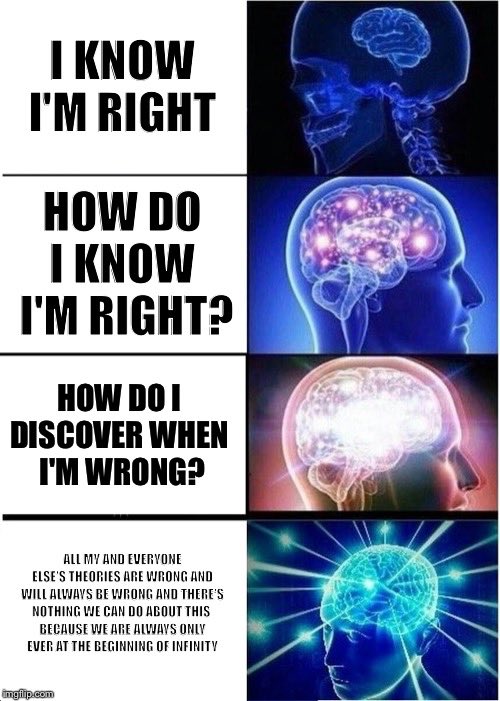curi
22-Aug-19 03:15 PM
how can that work in general? b/c everyone is or is expected to be approximately the same in a variety of ways. e.g. ~everyone hates being caught lying, whether in fact they lied or not, either way. so the standard of interaction she's used ot, which is normal, is to treat ppl based on their assumed preferences instead of stated ones, so they don't have to state things like "i am closed minded about potential lying by me"
so ppl treat each other by stereotypes, by assuming everyone is conventional. this pushes ppl to be more conventional, b/c they get treated like it either way, it makes it harder to be anything else.
and ppl punish you if you do anything different. e.g. hop being unhappy with me for following FI forum norms – which she never asked about or tried to understand – instead of those standard social norms.
and ppl routinely ignore my explicit, direct, clearly stated requests to be treated certain unconventional ways, e.g. to be told true statements instead of biased, false exaggerations
ppl typically see making a request about how you're treated, or expressing a preference about it, as admitting weakness (and/or trying to control them) and they attack you for it rather than trying to help.
separately, hop ... fuck i had a MAJOR other point. i just need a tiny trigger and i'll remember it all. hmmm
remembered. ppl ignore lots of what others say. when hop didn't recognize the quote of herself from a few minutes earlier, the main issue wasn't the failure to recognize it (which is one sign, of many, of lack of discussion experience and skill). the main issue was not asking what the text was. she had no viable theory of what that text was for and proceeded as if it wasn't there or didn't matter. this is very standard. ppl do this with each other all the time. if they think some text doesn't make sense or is dumb, they will try to ignore it and respond to other stuff.
this is, in general from a universal perspective, irrational. one needs a non-refuted theory of what the other person is saying to respond to. without one, one should seek clarification. if you don't, you are causing misunderstandings. and a lot of the misunderstandings will be hard to trace back to what you did. they will be all over the place and you won't know their source. happens a ton. affected lots of my conversation with hop. came up all over in ways that are hard to identify.
there are some reasons ppl do this. the idea of actually understanding everything the other guy is saying is more work. but if you're going to have a conversation it's worth doing it effectively instead of doing it badly to save effort (so you're sabotaging the effort you do put in). and ppl see it as effort with low rewards b/c they often talk with dumb ppl who say a bunch of dumb, pointless, confused stuff.
in the short term, their conversations seem to improve when they ignore most of the crap instead of responding to all of it (which just gets them even more crap in reply, in the sub-topics they're creating, and it spirals out of control)
however, they make mistakes when judging what's crap – and those mistakes are systematically biased, not random (they have blind spots and keep ignoring some of the info they most need). so even if the mistakes are uncommon, they're still a big deal. and it does cause a lot of the misunderstandings in the discussion that they blame on the other guy being dumb. and their discussion method is unsuitable for talking with good, worthwhile ppl who aren't saying crap. and it's hard to turn off and change methods.
and their method results in them not understanding what ppl are like, b/c they've spent their life not thinking about a lot of what ppl say to them.
this results in misunderstanding the world as well as e.g. being friends, spouses or business partners with the wrong ppl
this is part of the general issue of whether or not to accept error, and just try to put up with it, or whether to only ever use ideas that you don't know any errors with.
when you don't understand why someone said something, there is an error in your understanding of their communication. if you try to ignore this, you're not doing rational problem solving and you're undermining the whole project of the discussion by inserting contradictions, errors, cracks, flaws, etc, into the foundation (later discusion will build on it)
if you think an error is tangential, you can say so and see if the other person agrees. (say you think X might be an error, but you think it can be disregarded either way, whoever is right, b/c of being off-topic, and see if the other person agrees or not)
this is a major way that smart ppl cause the confusions and problems in their conversations with dumber ppl. a way the smarter guy bears a lot of the fault. i think smart ppl do this more b/c they see more dumbness. however, dumb ppl do it plenty too, partly b/c they just find it too hard to figure out what stuff means and they gave up on clearly understanding much during childhood.
we have a clear example of hop doing this and i suspect she did it at least 10 other times.
if i'm right and have good points and whatever, her actions – ignoring parts she doesn't understand – would prevent her from finding out and learning.
it causes major chaos b/c i don't know which parts she didn't understand. it's hidden from me.
so i can't try again to explain those parts. and then when i build on something she didn't understand, she often won't tell me about that problem either, she'll ignore that too.






































